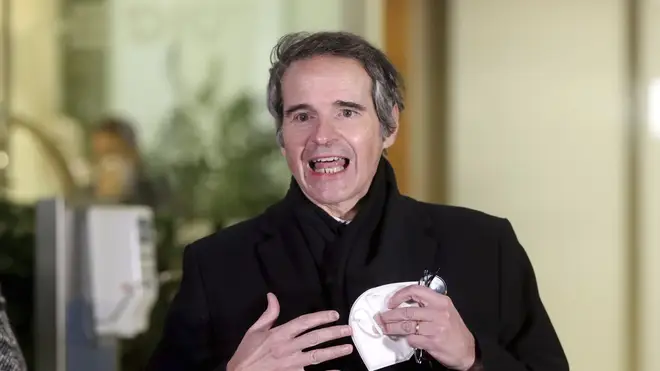
Richard Spurr 1am - 4am
21 February 2021, 21:24

The UN atomic watchdog’s chief, Rafael Grossi, made the comments came after an emergency trip to Iran.
Iran will begin to offer United Nations inspectors “less access” to its nuclear programme as part of its campaign to put pressure on the West, the UN atomic watchdog’s chief has said.
Rafael Grossi’s comments came after an emergency trip to Iran in which he said the International Atomic Energy Agency (IAEA) reached a “technical understanding” with Tehran to continue to allow monitoring of its nuclear programme for up to three months.
But his remarks to journalists underlined a narrowing window for the US and others to reach terms with Iran, which is already enriching and stockpiling uranium at levels far beyond those allowed by its 2015 nuclear deal with world powers.
“The hope of the IAEA has been to stabilise a situation which was very unstable,” Mr Grossi said at the airport after his arrival back in Vienna, where the agency is based.

“I think this technical understanding does it so that other political consultations at other levels can take place and most importantly we can avoid a situation in which we would have been, in practical terms, flying blind.”
Mr Grossi, the IAEA’s director general, offered few specifics of the agreement he had reached with Iranian leaders.
He said the number of inspectors on the ground would remain the same but that “what changes is the type of activity” the agency was able to carry out. He stressed monitoring would continue “in a satisfactory manner”.
Iranian Foreign Minister Mohammad Javad Zarif, who under President Hassan Rouhani helped reach the atomic accord, said the IAEA would be prevented from accessing footage from their cameras at nuclear sites. That came during a state TV interview on Sunday even before his meeting with Mr Grossi.
“This is not a deadline for the world. This is not an ultimatum,” Mr Zarif told the government-run, English-language broadcaster Press TV. “This is an internal domestic issue between the parliament and the government.”
“We have a democracy. We are supposed to implement the laws of the country. And the parliament adopted legislation — whether we like it or not.”
Mr Zarif’s comments marked the highest-level acknowledgement yet of what Iran planned to do when it stopped following the so-called “Additional Protocol”, a confidential agreement between Tehran and the IAEA reached as part of the landmark 2015 nuclear deal. The IAEA has additional protocols with a number of countries it monitors.
Under the protocol with Iran, the IAEA “collects and analyses hundreds of thousands of images captured daily by its sophisticated surveillance cameras”, the agency said in 2017. The agency also said then that it had placed “2,000 tamper-proof seals on nuclear material and equipment”.
In his interview, Mr Zarif said authorities would be “required by law not to provide the tapes of those cameras”.
It was not immediately clear if that also meant the cameras would be turned off entirely as Mr Zarif called that a “technical decision, that’s not a political decision”.
“The IAEA certainly will not get footage from those cameras,” Mr Zarif said.
Mr Grossi did not address Mr Zarif’s camera remarks on Sunday night but stressed that European and US leaders needed to salvage the situation through negotiations.
“What we have agreed is something that is viable. It is useful to bridge this gap,” Mr Grossi said. “It salvages this situation now but, of course, for a stable, sustainable situation there will have to be a political negotiation and that is not up to me.”
There are 18 nuclear facilities and nine other locations in Iran under IAEA safeguards.
In 2018, then-president Donald Trump pulled the US unilaterally out of the nuclear deal, known as the Joint Comprehensive Plan of Action, saying it needed to be renegotiated.
Even as Iran has backed away from restrictions of the deal since then to put pressure on the other signatories — Germany, France, Britain, Russia and China — to provide new economic incentives to offset US sanctions, those countries have insisted it is critical to keep the deal alive so that inspectors are able to continue to verify Iran’s nuclear activities.
From Washington, US National Security Adviser Jake Sullivan said President Joe Biden remained willing to negotiate with Iran over a return to the nuclear deal, an offer earlier dismissed by Mr Zarif.
“He is prepared to go to the table to talk to the Iranians about how we get strict constraints back on their nuclear programme,” Mr Sullivan told CBS’s Face The Nation. “That offer still stands, because we believe diplomacy is the best way to do it.”